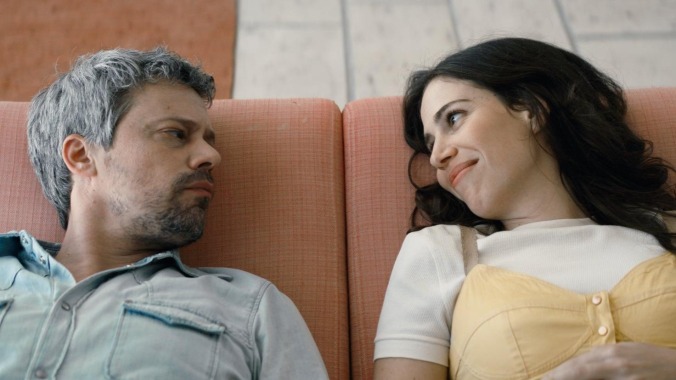In Ahed’s Knee, Nadav Lapid sacrifices political discourse for personal reminiscence
The winner of the 2021 Cannes Film Festival jury prize tackles subjects with a specificity when it should be making bigger points
Film Reviews Lapid
Winner of the Prix du Jury at last year’s Cannes Film Festival, Ahed’s Knee is an uncorked firehose of righteous personal anger. The autobiographical offering from writer-director Nadav Lapid melds video essay touches with the tunnel-visioned dramatic sensibilities of a more conventional two-hander.
Unfolding over the course of a single day, the film’s story centers on Y (Avshalom Pollak), an Israeli film director with an international profile who is in the midst of casting on his latest project, about a teenage Palestinian activist arrested for slapping an Israeli soldier (a real-life incident that gives Ahed’s Knee its title). Invited to the local library of small desert town Sapir for a screening and discussion of one of his earlier works, Y is greeted warmly by Yahalom (Nur Fibak), a deputy director of the ministry of culture who grew up nearby and still has family in the Arava region.
As Y struggles to cope with the recent news of his mother’s lung cancer diagnosis, sending her messages and videos from afternoon wanderings prior to the evening’s screening, he becomes piqued and disillusioned by Yahalom’s request of a bureaucratic formality, for him to sign a form and check boxes from a list of prescribed, state-sanctioned topics for the film’s post-screening Q&A.
Charged feelings and ideas regarding identity—of both free will and complicity within corrupt or harmful systems—are central to Lapid’s work, and of course are at the core of Ahed’s Knee. As with his 2019 film Synonyms, there is an explicit rejection of national identity, rooted in a howling guilt over Israeli human rights abuses and the perceived blossoming suppression of discourse regarding the same. The incredible specificity of this informs much of Ahed’s Knee’s emotional punching power, such as it is.
It’s frankly rare to see a movie so directly address the ongoing Israeli-Palestine conflict in a way that isn’t about war, the occupied West Bank, or kindly shopkeepers attempting to navigate cultural differences. Instead, Ahed’s Knee centers the societal divisions that continued social inequities and nationalist cultural policies foist upon successive generations.
If the film’s cross-examination of moral responsibility is bracing, however, it’s also worth asking for whom Ahed’s Knee is intended. In both its staging and execution, the movie feels more like a wild sermon to a very small choir rather than a broad-lensed work that could unlock minds and change hearts.
A big part of this is rooted in Lapid’s two main characters, who feel prescriptive. They aren’t boring; the compromises and contradictions their lived experiences hold assure some intrigue. But they also feel tightly held in servitude to the film’s themes of cultural dislocation and moral crisis rather than fully fleshed out. For example, Lapid gives Y a wicked sense of humor (asked where his ideas come from, the filmmaker drolly notes “the foul taste of morning”), but doesn’t consistently integrate this trait.
This perhaps best explains why so much of Lapid’s movie feels like it’s biding time until the last 10 minutes, when Ahed’s Knee makes a grand play for an emotional catharsis that feels both inevitable and yet also unearned. It’s here that the film’s only supporting character with any dimensionality, a driver (Yoram Honig) who shuttles Y around, comes into starkest relief. As Y grapples with what to do about the form and steps onto the stage for the Q&A, the finale reveals itself to be a missed opportunity to expand the film’s scope and vision.
Instead, in collaboration with cinematographer Shaï Goldman, Lapid studs his work with stylistic flourishes. Foremost among these is a series of endless whip-pans, in tight close-ups. Intended to mimic and reinforce the narrative’s bluntness, its use of dialogue for mood and texture more than plot, this tack eventually comes off as merely grating and empty. There are also a number of musical sequences (some groovy, some boisterous) set to popular songs, which at least offer a respite from the grindingly repetitive nature of the story.
The actors are able to pull the viewer along by the barest strand, if they’re sympathetic to the movie’s indulgences. Pollak has a certain rumpled, louche physicality, like a cross between Mathieu Amalric and Benicio del Toro. His performance communicates in very economic terms the façade of Y’s inflated self-regard, so crucial to the crisis he experiences. Fibak, meanwhile, embodies her character’s tension between duty and ambivalence.
If it sounds flamboyantly colorful to call Ahed’s Knee the cinematic equivalent of an echoing regurgitative scream, it’s also accurate. The film is a highly personal work that becomes trapped in its own feedback loop, making the same point over and over. Based on an event that happened to Lapid and written soon after the death of his mother (who worked as an editor on many of his projects), the movie folds in and riffs on some additional details from its maker’s life.
But it lacks the shrewd observance and thoughtfulness of Lapid’s previous films, 2011’s Policeman, 2014’s The Kindergarten Teacher (subsequently remade for the English language in 2018 by producer-star Maggie Gyllenhaal), and arguably even Synonyms, which won the Golden Bear at the Berlin Film Festival and was similarly provocative but at least much more strongly rooted in character.
One can admire its intensity and depth of feeling, as well as the distressed self-surveying at its core, and still find the Ahed’s Knee an unfocused harangue. It’s a messy and undisciplined first draft, the work of an auteur not pressed on intent.
2 Comments
“the perceived blossoming suppression of discourse”
“Blossoming” is an odd choice of word there.
“The Kindergarten Teacher (subsequently remade for the English language in 2018 by producer-star Maggie Gyllenhaal)”
Convention would be to credit the director, Sara Colangelo.
No one owes it to you to address political points in their movie.